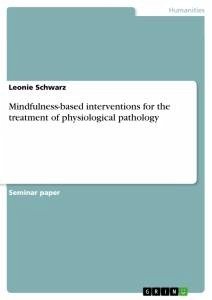Seminar paper from the year 2021 in the subject Psychology - Personality Psychology, Maastricht University, language: English, abstract: Mindfulness-based interventions (MBIs) are structured programs that employ mindfulness to alleviate symptoms of psychiatric, psychosomatic or physical conditions. While the benefit of MBIs for psychopathology is well established, research on MBIs for physiological conditions is still in its infancy and possible mechanisms of actions are rarely discussed. However, integrating cost-effective MBIs into medical interventions might offer novel multidisciplinary treatment options for conditions with underlying psychophysical or chronic inflammatory states. Accordingly, possible mechanisms of action of MBIs that exert influence on physiological diseases are evaluated. Namely, the mindfulness stress buffering hypothesis, the mind-body genomics model and a reduction in negative affect reduction theory are discussed. The examination indicates that MBIs might work by reducing chronic inflammatory states, altering gene expression and impacting hormonal secretion. Further, the reduction of negative affect seems to be associated to various positive health outcomes. Preliminary research findings reveal moderate effect sizes in the treatment of conditions such as cardiovascular disease, psoriasis, diabetes and chronic pain. However, the results should be treated with caution as control-groups and follow-ups were often absent. Further, a clear definition of mindfulness is necessary for improved scientific operalization. Problematic is that only one MBI incorporates physical exercise, which might confound positive health outcomes. Nevertheless, the reviewed literature indicates preliminary support for the hypothesis, that MBIs may be suitable for complementary treatment of physical condition
Hinweis: Dieser Artikel kann nur an eine deutsche Lieferadresse ausgeliefert werden.
Hinweis: Dieser Artikel kann nur an eine deutsche Lieferadresse ausgeliefert werden.








